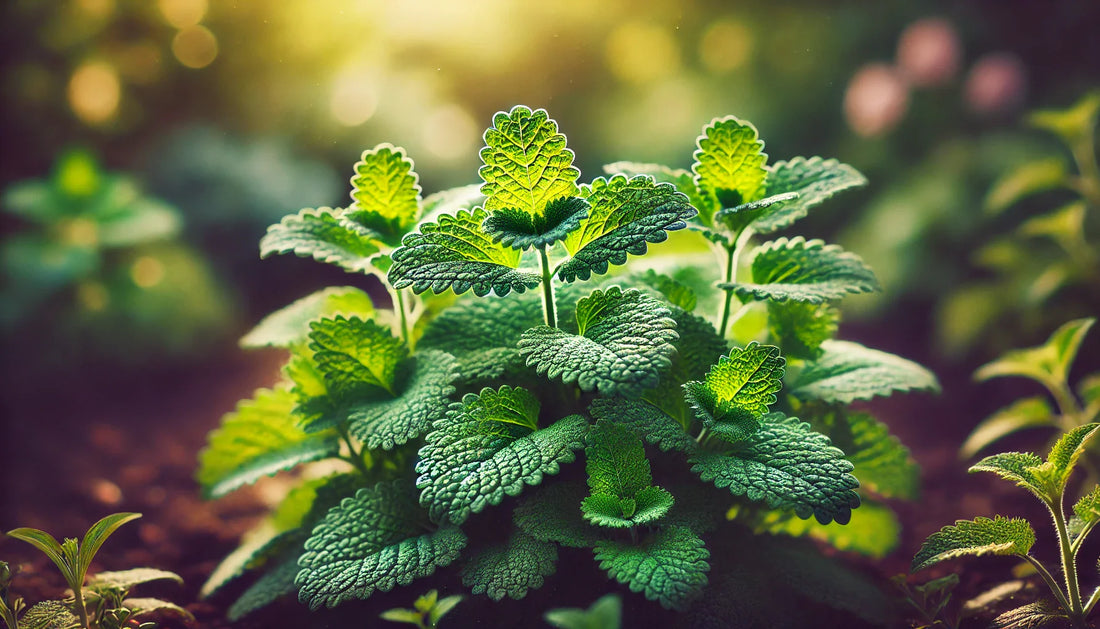
Lemon Balm: The Herb of Calm and Vitality
Cody ManesShare
A Soothing Touch of Nature
Lemon balm (Melissa officinalis), a fragrant herb in the mint family, has been cherished for centuries for its calming properties and uplifting citrus scent. Known as the "Herb of Calm," lemon balm is prized for its ability to soothe stress, support digestion, and promote restful sleep. Beyond its medicinal benefits, this versatile herb has been used in culinary creations, aromatherapy, and rituals for emotional and spiritual well-being. Its vibrant green leaves and delicate lemony aroma make it a cherished addition to gardens and wellness practices alike.
The History of Lemon Balm
Lemon balm has a storied history stretching back over 2,000 years. Native to the Mediterranean and parts of Europe, it was highly regarded by ancient civilizations for its medicinal and spiritual qualities. The Greeks and Romans used lemon balm as a remedy for various ailments, including indigestion, anxiety, and wounds. Its Latin name, Melissa, meaning "honeybee," reflects its association with bees, which are naturally drawn to its nectar-rich flowers.
In medieval Europe, lemon balm was a staple in monastery gardens, cultivated by monks who prized its healing properties. It was a key ingredient in "Carmelite Water," a herbal tonic believed to relieve stress and enhance longevity. During the Renaissance, herbalists like Paracelsus extolled lemon balm’s virtues as a rejuvenating elixir, often referring to it as the "elixir of life."
Today, lemon balm continues to be celebrated as a gentle yet powerful herb for supporting physical, emotional, and spiritual health. Its enduring popularity is a testament to its versatility and effectiveness in promoting well-being.
Spiritual Properties of Lemon Balm
Spiritually, lemon balm is associated with peace, clarity, and emotional balance. Its calming energy makes it an excellent herb for grounding and centering practices. In rituals, lemon balm is often used to dispel negativity and invite harmony into one’s life. Its uplifting aroma fosters a sense of renewal, helping individuals release emotional burdens and embrace a positive outlook.
Lemon balm is also associated with love and compassion. In ancient traditions, it was used in love spells and charms to attract affection and deepen emotional connections. Its energy is gentle and nurturing, making it a valuable ally for heart-centered work, whether it involves cultivating self-love or fostering harmonious relationships.
In meditation, lemon balm enhances focus and tranquility, allowing practitioners to quiet the mind and connect with their inner selves. Its soothing vibrations promote spiritual clarity and a deeper connection to the present moment, making it a cherished herb for mindfulness practices.
Emotional Benefits of Lemon Balm
Emotionally, lemon balm is a soothing herb that provides comfort during times of stress, anxiety, and overwhelm. Its calming properties help to balance emotions, reduce tension, and promote a sense of inner peace. For those experiencing mood swings or emotional fatigue, lemon balm offers gentle support, encouraging resilience and stability.
This herb is particularly effective for managing nervous energy and fostering relaxation. It helps individuals navigate life’s challenges with a clear and composed mindset, reducing feelings of irritability and restlessness. Its ability to uplift the spirit makes it a popular choice for those seeking emotional balance and a brighter outlook.
Lemon balm’s nurturing energy also encourages self-care and self-compassion. By soothing the heart and calming the mind, it provides the emotional space needed to process feelings and heal from emotional strain. Its gentle presence acts as a balm for the soul, fostering emotional renewal and well-being.
Physical Healing Properties of Lemon Balm
Lemon balm has a long-standing reputation as a versatile herb for physical health. Its calming properties extend to the nervous system, where it helps to alleviate symptoms of stress and anxiety. Lemon balm is also a natural remedy for promoting restful sleep, often used in teas and tinctures to combat insomnia and support relaxation.
In addition to its calming effects, lemon balm is beneficial for digestion. It helps to ease bloating, indigestion, and nausea, making it a popular choice for digestive support. Its antispasmodic properties also make it effective for relieving stomach cramps and tension in the digestive tract.
Lemon balm is known for its antiviral properties, particularly against cold sores caused by the herpes simplex virus. Its topical application can soothe irritation and speed up the healing process. Rich in antioxidants, lemon balm also supports overall vitality by protecting the body from oxidative stress and promoting healthy immune function.
Protective Qualities of Lemon Balm
Lemon balm is not traditionally viewed as a protective herb in the same way as sage or rosemary, but its calming and uplifting energy provides a unique form of spiritual protection. By fostering emotional balance and mental clarity, it helps individuals shield themselves from stress and negativity. Its ability to dispel worry and promote harmony creates an energetic barrier that enhances resilience and inner peace.
In rituals and energy work, lemon balm can be used to cleanse the mind and spirit of lingering negativity. Its gentle yet effective energy encourages a sense of safety and comfort, making it a valuable addition to protective practices. By incorporating lemon balm into one’s daily routine, it becomes easier to maintain a balanced and harmonious state of being.
Practical Uses and Applications
Lemon balm’s versatility makes it easy to incorporate into daily life. As a culinary herb, its citrusy flavor pairs well with teas, desserts, and savory dishes. A simple lemon balm tea, made by steeping fresh or dried leaves in hot water, provides a soothing and refreshing beverage that supports relaxation and digestion.
In aromatherapy, lemon balm essential oil is prized for its calming and uplifting scent. It can be diffused to create a serene atmosphere or applied topically (diluted) to relieve tension and promote emotional balance. Its bright and cheerful aroma makes it a favorite for creating an uplifting environment.
For those interested in herbal skincare, lemon balm’s antimicrobial and soothing properties make it an excellent ingredient for creams, balms, and toners. It can be used to calm irritated skin and promote a healthy complexion. Additionally, lemon balm can be grown in home gardens or containers, providing a readily available supply of fresh leaves for teas, cooking, and rituals.
Caring for Lemon Balm
Lemon balm is a hardy and low-maintenance herb that thrives in a variety of conditions. It prefers well-drained soil and partial to full sunlight but can adapt to less-than-ideal environments. Regular pruning encourages bushy growth and prevents the plant from becoming too woody.
To harvest lemon balm, pick the leaves in the morning when their essential oils are most concentrated. Fresh leaves can be used immediately or dried for later use. To dry lemon balm, spread the leaves in a single layer on a clean surface in a well-ventilated area, away from direct sunlight. Store dried leaves in an airtight container to preserve their potency.
Finding Serenity Through Lemon Balm
Lemon balm is a versatile and cherished herb that supports physical, emotional, and spiritual well-being. Its calming properties, uplifting aroma, and gentle energy make it a valuable ally for managing stress, promoting relaxation, and fostering resilience. Whether enjoyed as a soothing tea, used in rituals, or cultivated in a garden, lemon balm offers a timeless connection to nature’s healing power.
Explore Mystic Apothecary’s collection of ethically sourced herbs and tools to discover the magic of lemon balm. Let this humble yet powerful herb inspire tranquility, balance, and vitality in your daily life.
Ready for more? Dive into our next topic: Fern
